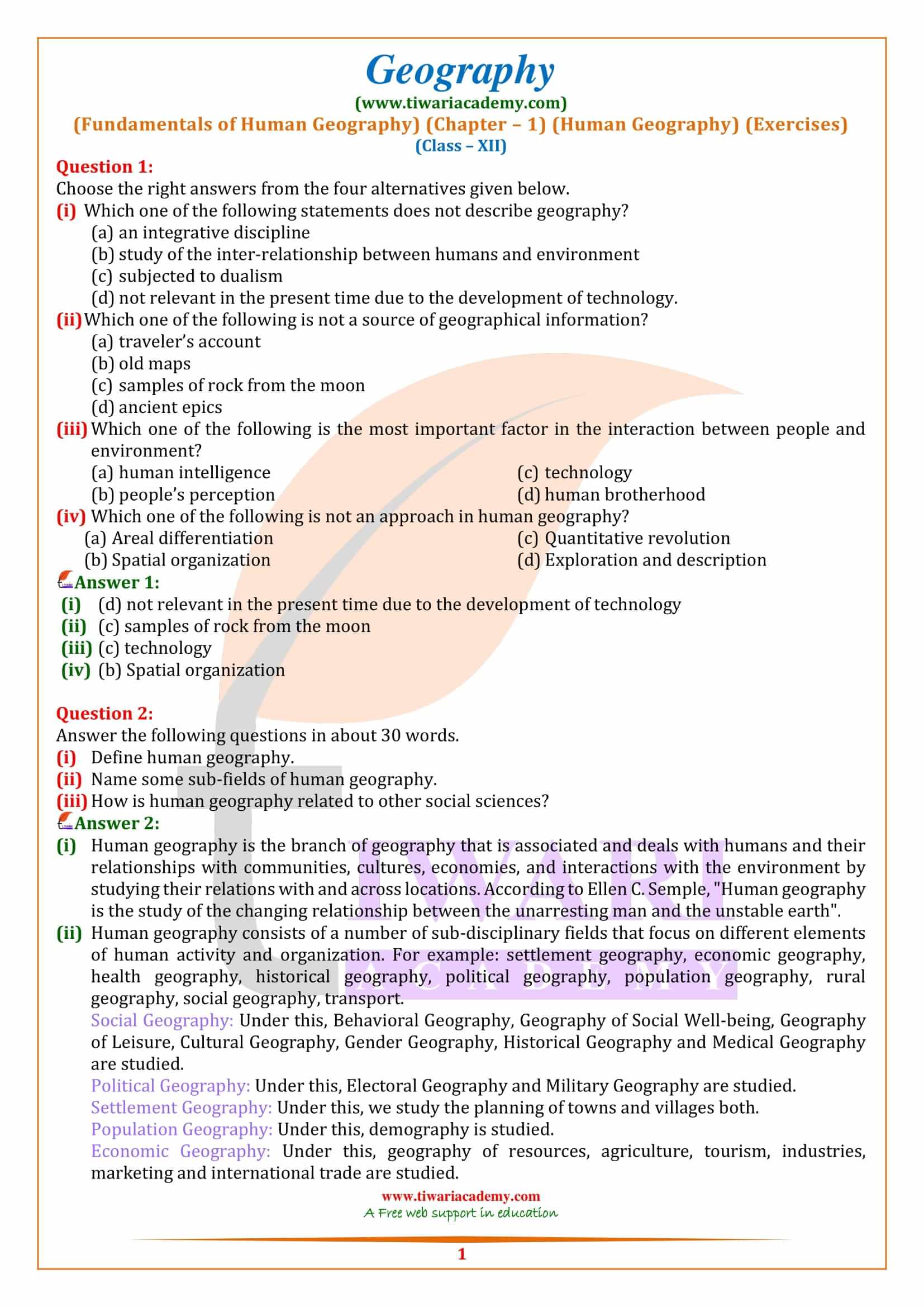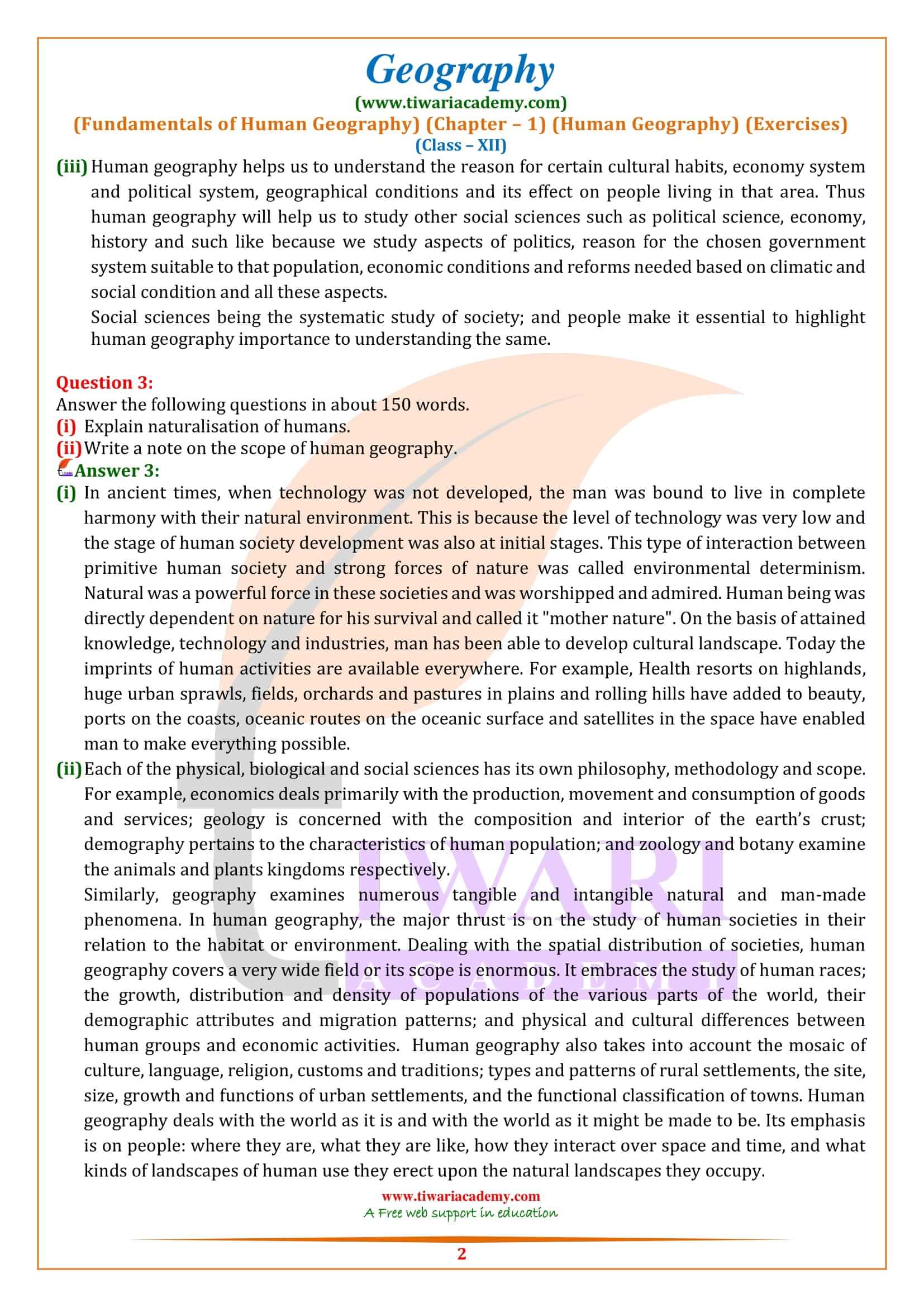NCERT Solutions for Class 12 Geography Chapter 1 Human Geography Nature and Scope in Hindi and English Medium exercises question answers for CBSE 2025-26. Get here practice question answers of Fundamentals of Human Geography unit 1 chapter 1 with complete explanation.
NCERT Solutions for Class 12 Geography Chapter 1
Class 12 Geography Chapter 1 Human Geography Nature and Scope Question Answers
What is human geography?
Human geography is the branch of geography that is associated and deals with humans and their relationships with communities, cultures, economies, and interactions with the environment by studying their relations with and across locations. According to Ellen C. Semple, “Human geography is the study of the changing relationship between the unarresting man and the unstable earth”.
Class 12 Geography Chapter 1 MCQ with Answers
Which one of the following statements does not describe geography?
Which one of the following is not a source of geographical information?
Which one of the following is the most important factor in the interaction between people and environment?
Which one of the following is not an approach in human geography?
Name some sub-fields of human geography.
Human geography consists of a number of sub-disciplinary fields that focus on different elements of human activity and organization. For example: settlement geography, economic geography, health geography, historical geography, political geography, population geography, rural geography, social geography, transport.
- Social Geography:
Under this, Behavioral Geography, Geography of Social Well-being, Geography of Leisure, Cultural Geography, Gender Geography, Historical Geography and Medical Geography are studied. - Political Geography:
Under this, Electoral Geography and Military Geography are studied. - Settlement Geography:
Under this, we study the planning of towns and villages both. - Population Geography:
Under this, demography is studied. - Economic Geography:
Under this, geography of resources, agriculture, tourism, industries, marketing and international trade are studied.
How is human geography related to other social sciences?
Human geography helps us to understand the reason for certain cultural habits, economy system and political system, geographical conditions and its effect on people living in that area. Thus human geography will help us to study other social sciences such as political science, economy, history and such like because we study aspects of politics, reason for the chosen government system suitable to that population, economic conditions and reforms needed based on climatic and social condition and all these aspects.
Social sciences being the systematic study of society; and people make it essential to highlight human geography importance to understanding the same.
Explain naturalisation of humans.
In ancient times, when technology was not developed, the man was bound to live in complete harmony with their natural environment. This is because the level of technology was very low and the stage of human society development was also at initial stages. This type of interaction between primitive human society and strong forces of nature was called environmental determinism. Natural was a powerful force in these societies and was worshipped and admired.
Human being was directly dependent on nature for his survival and called it “mother nature”. On the basis of attained knowledge, technology and industries, man has been able to develop cultural landscape. Today the imprints of human activities are available everywhere. For example, Health resorts on highlands, huge urban sprawls, fields, orchards and pastures in plains and rolling hills have added to beauty, ports on the coasts, oceanic routes on the oceanic surface and satellites in the space have enabled man to make everything possible.
Write a note on the scope of human geography.
Each of the physical, biological and social sciences has its own philosophy, methodology and scope. For example, economics deals primarily with the production, movement and consumption of goods and services; geology is concerned with the composition and interior of the earth’s crust; demography pertains to the characteristics of human population; and zoology and botany examine the animals and plants kingdoms respectively.
Similarly, geography examines numerous tangible and intangible natural and man-made phenomena. In human geography, the major thrust is on the study of human societies in their relation to the habitat or environment. Dealing with the spatial distribution of societies, human geography covers a very wide field or its scope is enormous. It embraces the study of human races; the growth, distribution and density of populations of the various parts of the world, their demographic attributes and migration patterns; and physical and cultural differences between human groups and economic activities.
Human geography also takes into account the mosaic of culture, language, religion, customs and traditions; types and patterns of rural settlements, the site, size, growth and functions of urban settlements, and the functional classification of towns. Human geography deals with the world as it is and with the world as it might be made to be. Its emphasis is on people: where they are, what they are like, how they interact over space and time, and what kinds of landscapes of human use they erect upon the natural landscapes they occupy.



